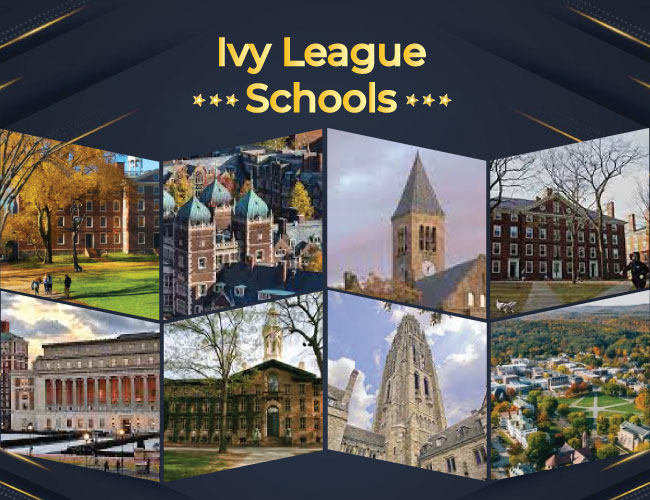Table of Contents
Ivy League Schools
The Ivy League, a group of eight top-notch universities in the United States, stands out for its academic excellence and powerful alumni networks. These schools let in about 5% of applicants each year picking the best of the best. As you think about your education path at an Ivy, knowing what makes these institutions special can help you make informed choices about your academic future.
Ivy at a Glance:
- Harvard MBA has the lowest acceptance rate at 9.90%, followed by Columbia at 16.50%, and Yale School of Management at 17.40%.
- On an average, Ivy schools accept SAT scores of 1560+, GMAT scores of 725+, GRE scores of 325+, and IELTS scores of 7.5 or higher.
- Studying at Ivy schools costs between $70,000 and $81,000 for undergraduate programs and $50,000 to $62,000 yearly for postgraduate programs.
- Students can apply for merit-based or need-based scholarships to help with costs.
- Career-wise, undergrads can expect to earn around $68,000 per year as a starting salary, while Master’s graduates can expect about $75,000 per year.
In this article, we’ll discover why Ivy League colleges are so popular and highly competitive.
What are Ivy League Schools?
For centuries, Ivy League schools have symbolized a remarkable blend of the old and the new, preserving historical traditions while fostering innovation and forward-thinking in its prestige and deep-rooted customs. The Ivy League has 8 schools: Harvard, Yale, Princeton, Columbia, Brown, Dartmouth, Cornell, and the University of Pennsylvania. Each institution is renowned for its distinctive identity and contribution to societal progress. This unique duality, where they keep old traditions alive while coming up with new ideas for the future, is what makes the Ivy League not just a group of universities but a symbol of long-lasting influence in higher education.
Why are They Called the Ivy League?
The term “Ivy League” has become synonymous with prestige and academic excellence, but its origins are humbler and more rooted in athletics rather than academia. Stanley Woodward, who wrote about sports for the New York Herald Tribune, is said to have come up with this term in the early 1900s. Initially, Ivy was just a way to talk about a football group comprising 8 private universities in the Northeastern United States.
Ivy League schools are highly known for their long-standing traditions and historical significance, and were already collaborating in various academic and non-academic ventures. Athletic competition among all eight institutions did not officially commence until the 1956–57 season; however, the Ivy League was officially admitted in 1954. The term has expanded beyond its original athletic context to reflect an underlying academic philosophy at some of the nation’s most renowned educational institutions.
History of Ivy League Universities
The Ivy League as we know it today took shape in the mid-20th century. However, the term “Ivy League” emerged in the 1930s. Each school in the Ivy League has its own special story linked to how higher education grew in America. For instance, Harvard, established in 1636, holds the title of the oldest institution of higher learning in the United States. Yale, Princeton, Columbia, Brown, Dartmouth, Cornell, and the University of Pennsylvania followed, each adding to the rich history of how education changed over time. In the early 1900s, they created leagues for different sports:
- The Eastern Intercollegiate Baseball League came into existence in 1930. It included Columbia, Cornell, Dartmouth, Penn, Princeton, and Yale. Harvard, Brown, Army, and Navy joined the league later.
- The organization that would become the NCAA began in 1906. Dartmouth and Penn were among its original members.
Over the centuries, these institutions have transformed significantly. They started with religious ties but grew into the well-known secular universities we see today. This journey is marked by a commitment to research, intellectual exploration, and societal contribution, which continues to define their global legacy.
Why are Ivy League Colleges So Popular?
Ivy League colleges have caught the eye of undergraduate students as well as postgraduate aspirants worldwide for years. This appeal stems from a combination of elements that set them apart from other institutions.
Strict Admission Criteria
People know Ivy League schools for their selective admissions process. For the class of 2025, 6 of the eight schools had acceptance rates under 6%. The admission standards and selectivity create high demand for seats, with 9 students turned down for each one accepted. The competitive nature of the admissions process ensures that the top academic performers and well-rounded students get in.
World-class Faculty and Research
One of the best things about Ivy League schools is how they attract and keep top teachers. These schools employ some of the brightest minds across various fields, including Nobel Prize winners and famous experts. Take Harvard, for instance. There, you can learn from big shots like Michael Porter and Greg Mankiw. This chance to interact with leading teachers and researchers gives students an amazing learning experience and exposes them to the latest ideas in their chosen areas of study.
Notable Alumni
Ivy League schools have a remarkable list of alumni who have made it big in many areas. More than a third of US Presidents went to an Ivy League college, and these schools together have a big chunk of Nobel Prize winners. The success of Ivy League graduates extends beyond politics and academia. According to research by Harvard economist Raj Chetty, 20% of Ivy League graduates went on to be in the top 1% of US earners within 15 years of graduation. This track record of success adds to the prestige and appeal of these institutions.
List of Universities under Ivy League
The Ivy League brings together eight top-notch private universities in the United States:
Harvard University
Founded in 1636, Harvard is in Cambridge, Massachusetts and is the oldest institution of higher education in the US. It consistently ranks at the top of national and global university rankings.
Yale University
Established in 1701, Yale is in New Haven, Connecticut. Yale’s commitment to liberal arts is exemplified by its prestigious Yale Graduate School of Arts and Sciences, which offers advanced degrees in numerous fields. Yale also has 13 professional schools, including the country’s top-ranked schools in law, medicine, and management.
Princeton University
Founded in 1746, Princeton is the fourth-oldest college in the country. Situated in Princeton, New Jersey, it’s renowned for its undergraduate programs and emphasis on research.
Columbia University
Located in New York City, Columbia is the oldest institution of higher education in New York State. It has been the birthplace of numerous significant technologies and platforms, including FM radio and the first college gay rights advocacy group.
Cornell University
Founded in 1865, Cornell is in Ithaca, New York. It stands out among Ivy League schools for its mix of classic education and hands-on subjects like agriculture and engineering.
Brown University
Situated in Providence, Rhode Island, Brown is known for its open curriculum, allowing students to design their own course of study.
Dartmouth College
Located in Hanover, New Hampshire, Dartmouth is the birthplace of the programming language BASIC. It houses the highly ranked Tuck School of Business, the world’s first graduate school of management.
University of Pennsylvania (Penn)
Founded in part by Benjamin Franklin in 1740, Penn is located in Philadelphia. Penn has the highest number of international students among Ivy League schools, with 12% of its student body coming from over 100 nations.
How Do Ivy League Colleges Differ from Others?
Academically, Ivy League schools consistently rank among the top universities globally. They share this distinction with other elite institutions like Stanford, MIT, and Caltech. While many excellent universities exist worldwide, Ivy League colleges stand out in several ways:
- Academic rigor: Ivy League schools have a reputation for hard coursework and high admission standards. The intense learning experience gets students ready to do well in their future jobs.
- Selectivity: With acceptance rates typically below 10%, admission selectivity is a hallmark of Ivy League institutions.
- Learning Opportunities: Top-tier schools, including Ivy League and non-Ivy institutions, offer many extracurricular activities. However, Ivy League schools may provide more extensive alumni networks and internship options because of their long-standing industry connections.
- Resources and facilities: These institutions boast substantial financial endowments, ranging from Brown’s $6.9 billion to Harvard’s $53.2 billion. This allows them to offer state-of-the-art research facilities and extensive support services to their students.
- Networking opportunities: Attending an Ivy League school gives you access to a vast network of accomplished alumni, invaluable for career opportunities and professional growth throughout your life.
- Career prospects: Ivy League graduates often land better jobs and earn higher starting pay. For instance, the median salary for a Harvard graduate is $158,000, while it’s $159,440 for Penn graduates.
Also Read: Ivy League Vs Non Ivy League Universities
Are Ivy League Colleges & Universities the Same?
Yes, Ivy League colleges and universities are the same in terms of belonging to the Ivy League. However, the term “college” often refers to undergraduate institutions within a larger university. For example, Harvard College is the undergraduate college of Harvard University, and Yale College is the undergraduate college of Yale University. These colleges, in turn, have various schools, such as law, medicine, and business schools.
Which is the Best Ivy College for an MBA Abroad?
Out of the eight Ivy League schools, six offer full-time MBA programs. To figure out which Ivy League school is best for an MBA, you should look at rankings and how well graduates do in their careers. Based on US News rankings, the Ivy League business schools can be ranked as follows:
- Wharton Business School
- Harvard Business School
- Yale School of Management
- Dartmouth Tuck School of Business
- Columbia Business School
- Cornell Johnson Graduate School of Management
Brown University offers an Executive MBA joint degree with IE Business School, while Princeton University does not offer an MBA program.
Looking at job prospects, Harvard and Wharton MBA graduates from the class of 2022 got the highest average base salary of $175,000. This high number shows how much value these programs provide to their students.
Choosing the right Ivy for your MBA
If you’re considering an Ivy League MBA, it’s essential to look beyond the prestige and find the right fit for your goals and personality. Consider factors such as:
- What can you study and major in?
- What life is like on campus and how people interact?
- How big are the classes and how many teachers there are for each student?
- What clubs and activities can you join?
- What kind of help can you get to pay for your MBA school?
FAQs
Which country is home to the Ivy League universities?
The Ivy League is situated in the US, in the northeast region of the country, and doesn’t have exact counterparts in other countries.
Is Yale a part of the Ivy League institutions?
Yes, Yale University is a part of the Ivy league universities.
Is Yale the most difficult Ivy League institution to gain admission to?
While Yale is highly selective, it is not considered the hardest Ivy League school to get into. Harvard University is generally regarded as the most challenging, with an acceptance rate of around 4.6%. Yale’s acceptance rate is approximately 6.6%, making it the fourth most competitive among the Ivy League schools.
Is it worthwhile to visit the Ivy League universities?
Absolutely! The Ivy League campuses are known for their beautiful landscape and rich history. Each campus has its unique charm and architectural style. Visiting these colleges can give you a feel for their atmosphere and help you decide if they might be a good fit for you.
What are the admission standards for Ivy League colleges?
Ivy League schools are known for their extremely high academic standards. They typically look for students with exceptional academic performance (GPA of 3.7 or higher), strong standardized test scores (SAT or ACT), impressive extracurricular activities, well-written essays, strong letters of recommendation.
How significant is it to be admitted to an Ivy League institution?
Ivy League schools give great education and connections, but they’re not the only way to succeed. People know these schools for their big names, and they can open doors in certain fields. But many other top schools teach just as well and give similar opportunities. How much an Ivy League school matters depends on your personal goals and career aspirations.
Do universities under the Ivy League provide financial aid?
All eight Ivy League schools provide generous financial aid, which can cover tuition, room and board, books, and other expenses for students who demonstrate financial need.
Do Ivy League schools offer merit-based scholarships?
Ivy League schools generally do not offer merit-based scholarships. Their financial aid is primarily need-based, meaning it is determined by your family’s financial situation.
What are the unique programs or opportunities available at Ivy League schools?
Ivy League schools offer a wide range of unique opportunities, including access to world-renowned faculty and researchers, state-of-the-art facilities and resources, extensive alumni networks, opportunities for interdisciplinary study, research opportunities at the undergraduate level, study abroad programs at equally prestigious universities worldwide.






